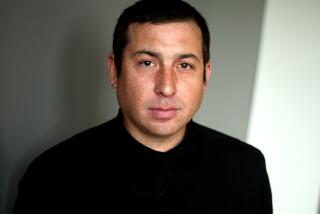Lost souls wander Chris Abani’s ‘Secret History of Las Vegas’
As a Nigerian who has lived long stretches in the U.K., Los Angeles and Chicago and whose novel “Graceland” in part concerned itself with the allure and dangers of identity shape-shifting, Chris Abani understands what cultural displacement can do to a person’s sense of self. In his powerful new novel, “The Secret History of Las Vegas,” Abani places his lost souls in a double-bind of assimilation: His protagonists are trying to shed their guilt over past sins as they attempt to transition into a simulacrum of a normal American life.
Needless to say, it doesn’t go so smoothly.
In “The Secret History of Las Vegas,” Abani uses the crime novel genre to examine the ways in which a number of protagonists — outsiders, all of them, but trying desperately not to be — unwittingly excavate the buried secrets of their past. “The thing about half-truths littered in among outright lies,” Abani writes, “is that they distract from the deeper secrets, the ones you really want to find.” It’s Tony Hillerman as filtered through J.M. Coetzee, a moving, strange and savagely funny book.
Abani sets up “The Secret History of Las Vegas” like a dutiful crime novelist should: There is a murder scene near Lake Mead in Nevada. Drums of blood, a suspicious-looking pair of conjoined twins, a van parked near the lake. A cop named Salazar is sent to investigate. The twins, a pair of grotesques named Fire and Water, are swimming nearby. Might they be the lead that Salazar has been searching for in vain — are they in fact the serial killers that have dumped a number of homeless corpses in the desert?
Although the book has all the requisite plot elements, the emphasis is ultimately not on whether Salazar solves this case. The mechanism of the plot instead throws Abani’s characters back into themselves, resulting in a wrenching meditation on the secrets that cannot be reconciled or effaced by time or geographic distance.
If “Graceland” used a boy’s quixotic personal journey as a jumping-off point for an examination of the horrors of Nigeria, so the shadow of apartheid looms over some of the memorable characters in “The Secret History of Las Vegas.” Vegas itself is a character in the book: that safe house of sin and reinvention, a city with no clocks in the casinos where lives are lived in an eternal present tense. Abani’s characters look for solace here.
Sunil Singh, the South African psychiatrist recruited by Salazar to investigate the murders, has come to Vegas to slip the noose of a terrible betrayal that resulted in the death of his parents. Sunil has devised a serum that regulates psychopathic behavior; he’s an alchemist of dark human impulses who can’t reconcile his own behavior. Succor for Sunil is a prostitute named Asia who shares his deep sense of shame but who can’t move his shadow away.
Conjoined twins Fire and Water are Abani’s most indelible creation; their disfiguration is the result of underground nuclear testing in Nevada, and now they are trying to avenge their mother’s radiation sickness and subsequent suicide with guerrilla tactics against the local nuclear power industry. Sharp-witted and desperate for connection, the twins are the Other that everyone in the book either shirks from or prods and palpates as if they are lab rats. Fire and Water become a ruling metaphor for Abani’s disenfranchised characters, cast adrift but trying to cling to a sense of belonging.
The murder mystery plot, such as it is, moves these characters toward a reckoning. Secrets are brought into the light, and a kind of absolution occurs. But redemption is another matter; Abani seems to suggest that real closure is the stuff of movies and bad crime novels. All the characters in this riveting book can do is live another day, the troubles of the past slowly receding behind them.
Weingarten is working on a book about L.A.’s water wars.
The Secret History of Las Vegas
A Novel
Chris Abani
Penguin: 336 pp., $16 paper
More to Read
Sign up for our Book Club newsletter
Get the latest news, events and more from the Los Angeles Times Book Club, and help us get L.A. reading and talking.
You may occasionally receive promotional content from the Los Angeles Times.






